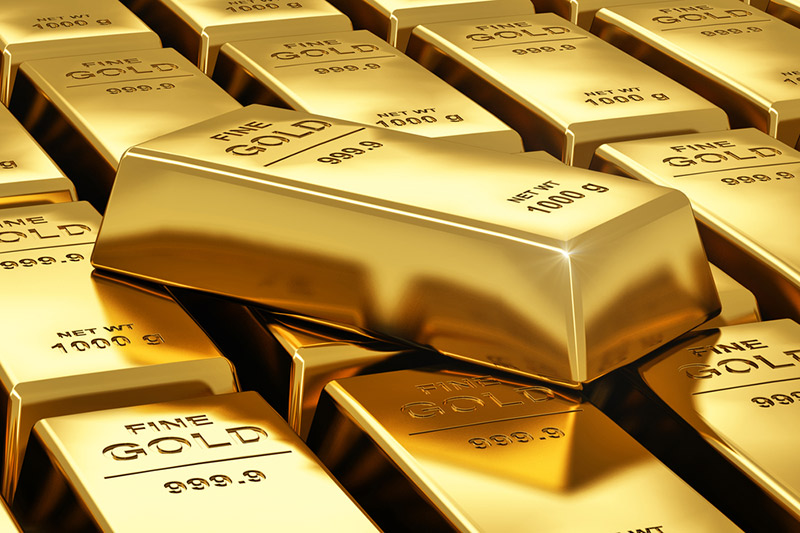Investing.com - Gold futures fluctuated between modest gains and losses on Thursday, after German Chancellor Angela Merkel reiterated her opposition to the creation of euro bonds, adding to concerns over the deepening debt crisis in the euro zone.
On the Comex division of the New York Mercantile Exchange, gold futures for December delivery traded at USD1,698.15 a troy ounce during early European morning trade, gaining 0.27%.
The December contract traded between a range of USD1,688.65 a troy ounce, the daily low and USD1,702.65, the daily high.
Trading volumes were expected to be light with NYMEX Floor trading shut for the U.S. Thanksgiving holiday. Electronic transactions would be booked with Friday’s trades for settlement purposes.
Speaking at a joint news conference with France's Nicolas Sarkozy and Italy's Mario Monti following a meeting earlier, Merkel reiterated her belief that joint bonds would remove incentives for individual states to improve their fiscal discipline.
The remarks fanned fears that European leaders will not be able to agree on a solution to the region’s debt crisis.
Also Thursday, ratings agency Fitch downgraded Portugal’s sovereign rating to junk status, saying it expects gross domestic product to contract by 3% in 2012, making the government's deficit reduction plan far more challenging to execute.
Although gold is usually regarded as a safe haven asset in times of economic uncertainty, the precious metal has tended to move in line with stocks and other risk-sensitive commodities in recent sessions, with investors piling in to the relative safety of the U.S. dollar.
In October 2008, gold prices tumbled 18% as turmoil in global financial markets led to losses in global equity and commodity markets. The precious metal rallied 23% in the next two months.
Meanwhile, data from the International Monetary Fund released Wednesday showed that Germany’s central bank lowered its gold reserves for the first time since December 2010 in October. The Bundesbank sold 150,000 troy ounces last month to bring its total reserves to 109.194 million ounces.
The IMF report showed that other central banks added to their gold holdings last month. Russia continued its program of gold accumulation, lifting its reserves by 627,000 ounces to 28.005 million ounces.
Kazakhstan also reported significant additions for the second consecutive month. Its reserves totaled 2.366 million ounces at the end of October, up from around 2.265 million ounces in September.
Elsewhere on the Comex, silver for December delivery fell 0.56% to trade at USD31.70 a troy ounce, while copper for December delivery tumbled 1.65% to trade at USD3.279 a pound.
On the Comex division of the New York Mercantile Exchange, gold futures for December delivery traded at USD1,698.15 a troy ounce during early European morning trade, gaining 0.27%.
The December contract traded between a range of USD1,688.65 a troy ounce, the daily low and USD1,702.65, the daily high.
Trading volumes were expected to be light with NYMEX Floor trading shut for the U.S. Thanksgiving holiday. Electronic transactions would be booked with Friday’s trades for settlement purposes.
Speaking at a joint news conference with France's Nicolas Sarkozy and Italy's Mario Monti following a meeting earlier, Merkel reiterated her belief that joint bonds would remove incentives for individual states to improve their fiscal discipline.
The remarks fanned fears that European leaders will not be able to agree on a solution to the region’s debt crisis.
Also Thursday, ratings agency Fitch downgraded Portugal’s sovereign rating to junk status, saying it expects gross domestic product to contract by 3% in 2012, making the government's deficit reduction plan far more challenging to execute.
Although gold is usually regarded as a safe haven asset in times of economic uncertainty, the precious metal has tended to move in line with stocks and other risk-sensitive commodities in recent sessions, with investors piling in to the relative safety of the U.S. dollar.
In October 2008, gold prices tumbled 18% as turmoil in global financial markets led to losses in global equity and commodity markets. The precious metal rallied 23% in the next two months.
Meanwhile, data from the International Monetary Fund released Wednesday showed that Germany’s central bank lowered its gold reserves for the first time since December 2010 in October. The Bundesbank sold 150,000 troy ounces last month to bring its total reserves to 109.194 million ounces.
The IMF report showed that other central banks added to their gold holdings last month. Russia continued its program of gold accumulation, lifting its reserves by 627,000 ounces to 28.005 million ounces.
Kazakhstan also reported significant additions for the second consecutive month. Its reserves totaled 2.366 million ounces at the end of October, up from around 2.265 million ounces in September.
Elsewhere on the Comex, silver for December delivery fell 0.56% to trade at USD31.70 a troy ounce, while copper for December delivery tumbled 1.65% to trade at USD3.279 a pound.
